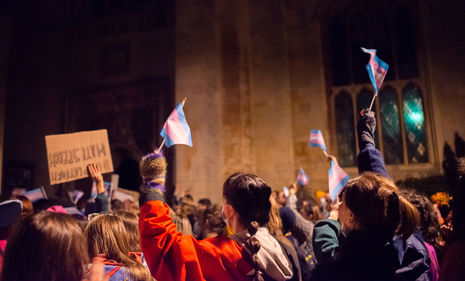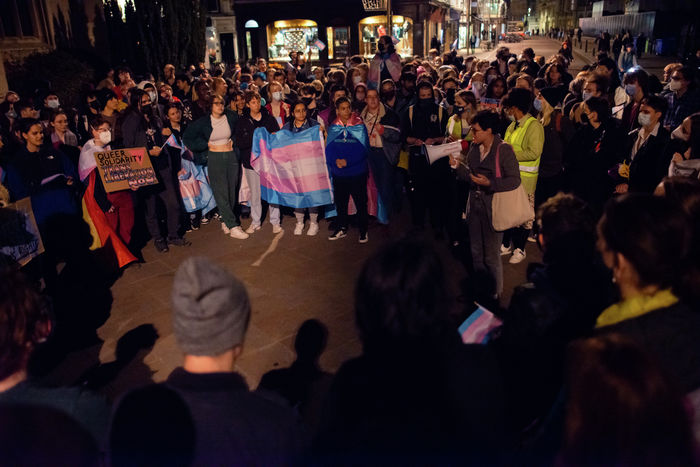The future includes trans people like me – whether you like it or not
Society is learning it must deal with trans people’s existence – but some would rather ignore us

A grim sort of progress is being made. Once, it was so impossible to exist as an out trans person that reactionaries felt no need to waste breath on intellectually disproving our existence; that a movement has sprung up whose aim is nothing less than the total eradication of transgenderism per se is a somewhat comforting thought, because it demonstrates that we are getting somewhere. The night, they say, is darkest before the dawn.
Recent events within the university have been seized upon by the right-wing press and manipulated in an attempt to cast transphobia as a free speech issue. Almost every trans student I know regards this framing as asinine (as if we present a real threat to the speech of published authors! We couldn’t even get a talk cancelled on home turf), but to explain why, we must remember that the “debate” over trans people’s lives is not one between two sides on even footing; rather, this is a debate between trans people on one side and the slaughterhouse on the other.
The modern anti-trans movement exists as the reaction of a system of power/knowledge to a direct existential threat. It may be taken as demonstrated – by the fact of millions’ existing outside its logic – that in reconciling transgenderism with our cultural understanding of sex and gender the issue is not with any individual, but with the structures of thought themselves; this is to say, it is not the former which must change but the latter. With this in mind, we have come to demand respect for ourselves as ourselves, rather than shaping ourselves into respectable forms – and it is precisely because of the enormity of the challenge that accounting for the existence of trans people presents to a normative model of sex and gender that such extreme opposition has risen to meet us.
Wherever we go from here, our society will be one in which transgender people cannot be ignored, as perhaps we used to be
The destabilising challenge that transness presents is this: that the cisgendered body is constructed by sociomedical discourses as much as is the trans body. Which groups of children and adolescents are encouraged towards physically strenuous activity, and which groups develop eating disorders at higher rates? Which children are told they are growing and need to eat, and which that they ought to consider dieting? Which children go through painful laser hair removal or electrolysis to remove ‘undesirable’ facial hair? What assumptions can be reliably made about the immutable differences between the sexes in light of a status quo which sees the human body radically altered according to assigned sex? No cisgender person exists whose body has not been subtly shaped throughout his/her life by cultural expectations of gender. Our understanding of sex is not produced by our observations of men and women’s bodies, but rather the other way round; it is the lens through which our observations are made.
So-called gender-critical feminism in reality consists of a collection of thought-terminating clichés designed to halt any inquiry into the nature of sex and gender before it begins. Rather than seeking to find answers to the challenges posed by transgender people’s existence to a normative understanding of gender, it negates these challenges by claiming that trans people do not exist per se (i.e. that trans women substantively are men, and vice versa); it affirms rather than questions standard assumptions about what defines men and women. For example: upon its release, ultra-conservative pundit Matt Walsh’s film ‘What is a woman?’ was met with acclaim by several gender-critical figures; the film ends with Walsh’s wife answering the question as follows: “A woman is an adult human female who needs help opening this jar”.
What drives us to protest or seek the cancellation of events featuring speakers ideologically motivated by transphobia is not in fact an opposition to the concept of freedom of speech; rather, it might be thought of as an anxiety that our cisgender peers – the people with whom we share a collegiate and scholarly life – might be taken in by the easy answers. The potential consequence of proudly transphobic speech being brought to this university is that it takes root and spreads; ultimately, that transgender students might find themselves sharing supervisions (let alone accommodation) with students who have come to believe strongly in a transphobia beyond mere ignorance; one that fundamentally denies our subjective experience and seeks to strip them of our rights to self-determination, bodily autonomy (through the denial of access to healthcare), and participation in public society. Civility between a trans person and a “gender critical” ideologue exists to the extent that civility can exist between someone with a boot on their neck and the person wearing the boot.
The genie has been uncorked. Wherever we go from here, our society will be one in which transgender people cannot be ignored, as perhaps we used to be. As those who seek to deny us the right to participate in public society have become a minority, they have become vocal. To those women among their number who call themselves feminists, I would like to point out that it has not been so very long since you were in a similar position. Do the names George Eliot, George Sand or Ellis, Currer and Acton Bell mean anything to you? The ultimate goal of the anti-trans movement is to push transgender people to pretend to be cisgender; this amounts to a degradation of the human spirit, and the promotion of it should not find a home in our university.
Victoria is a recent graduate from Clare College. She is a trans woman.
 News / Cambridge academics stand out in King’s 2026 Honours List2 January 2026
News / Cambridge academics stand out in King’s 2026 Honours List2 January 2026 Interviews / You don’t need to peak at Cambridge, says Robin Harding31 December 2025
Interviews / You don’t need to peak at Cambridge, says Robin Harding31 December 2025 News / AstraZeneca sues for £32 million over faulty construction at Cambridge Campus31 December 2025
News / AstraZeneca sues for £32 million over faulty construction at Cambridge Campus31 December 2025 Comment / Plastic pubs: the problem with Cambridge alehouses 5 January 2026
Comment / Plastic pubs: the problem with Cambridge alehouses 5 January 2026 News / Cambridge businesses concerned infrastructure delays will hurt growth5 January 2026
News / Cambridge businesses concerned infrastructure delays will hurt growth5 January 2026









